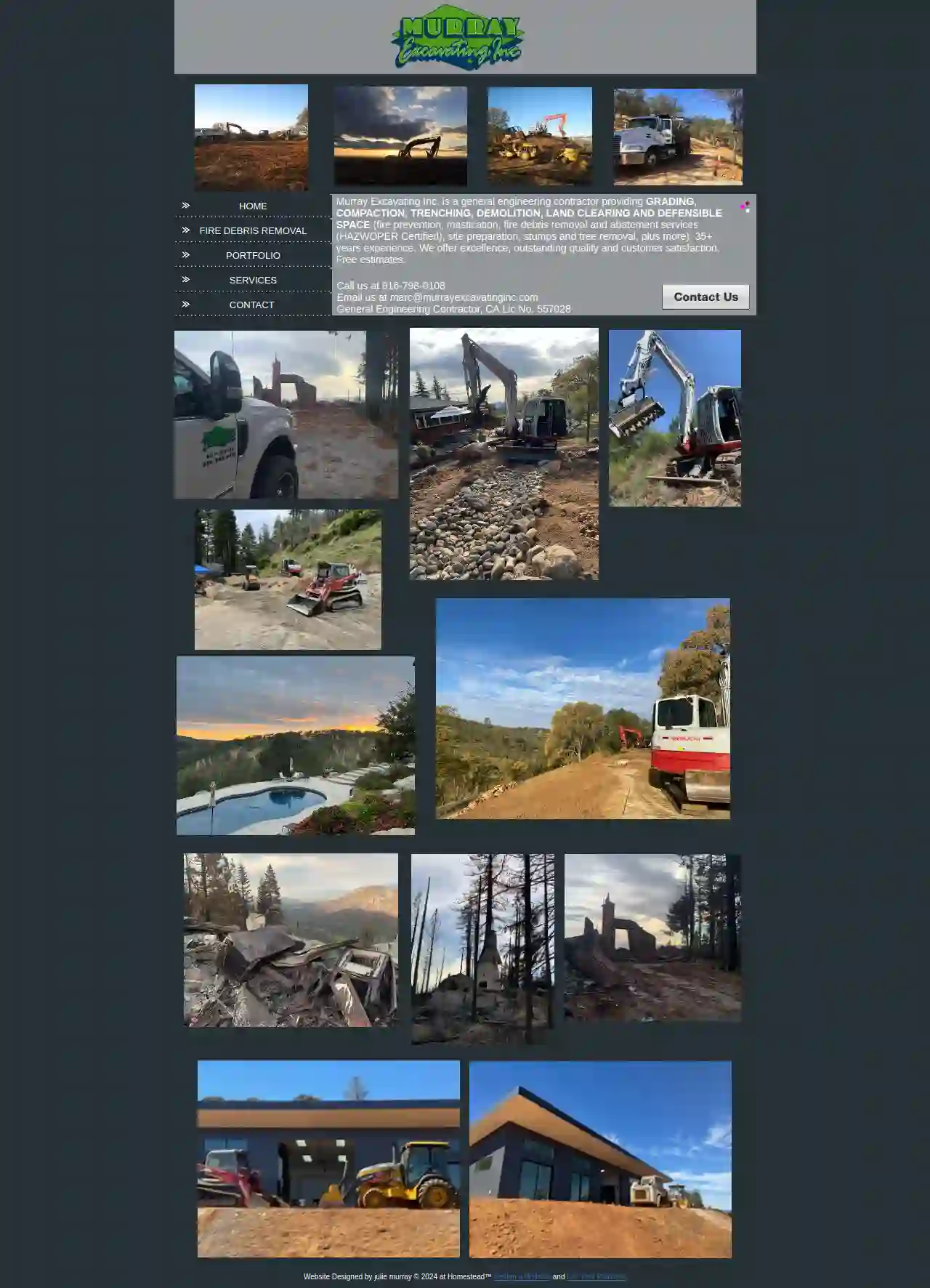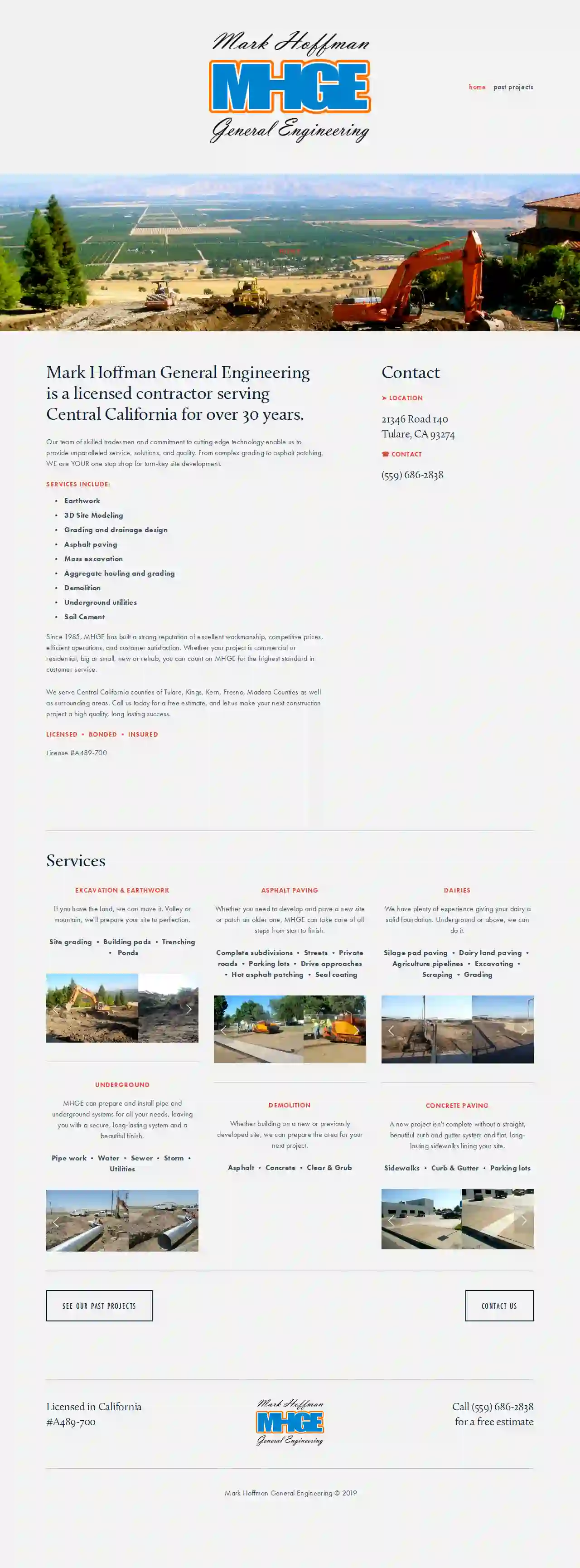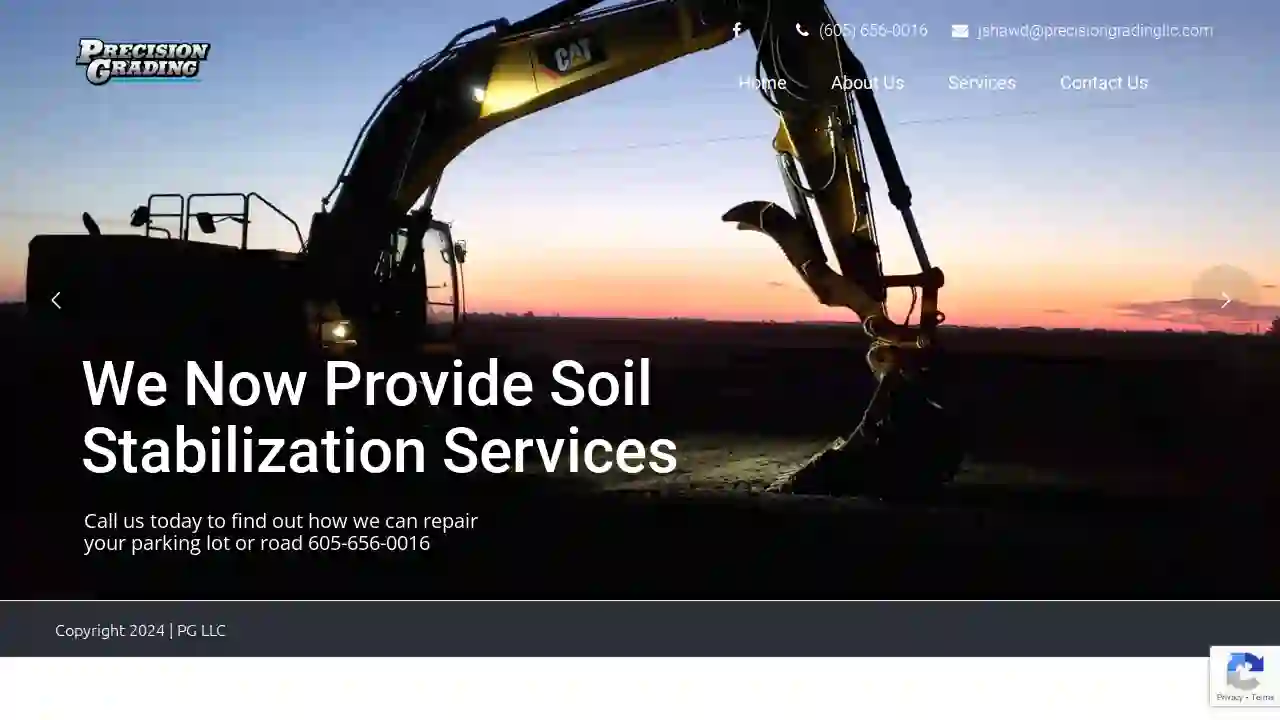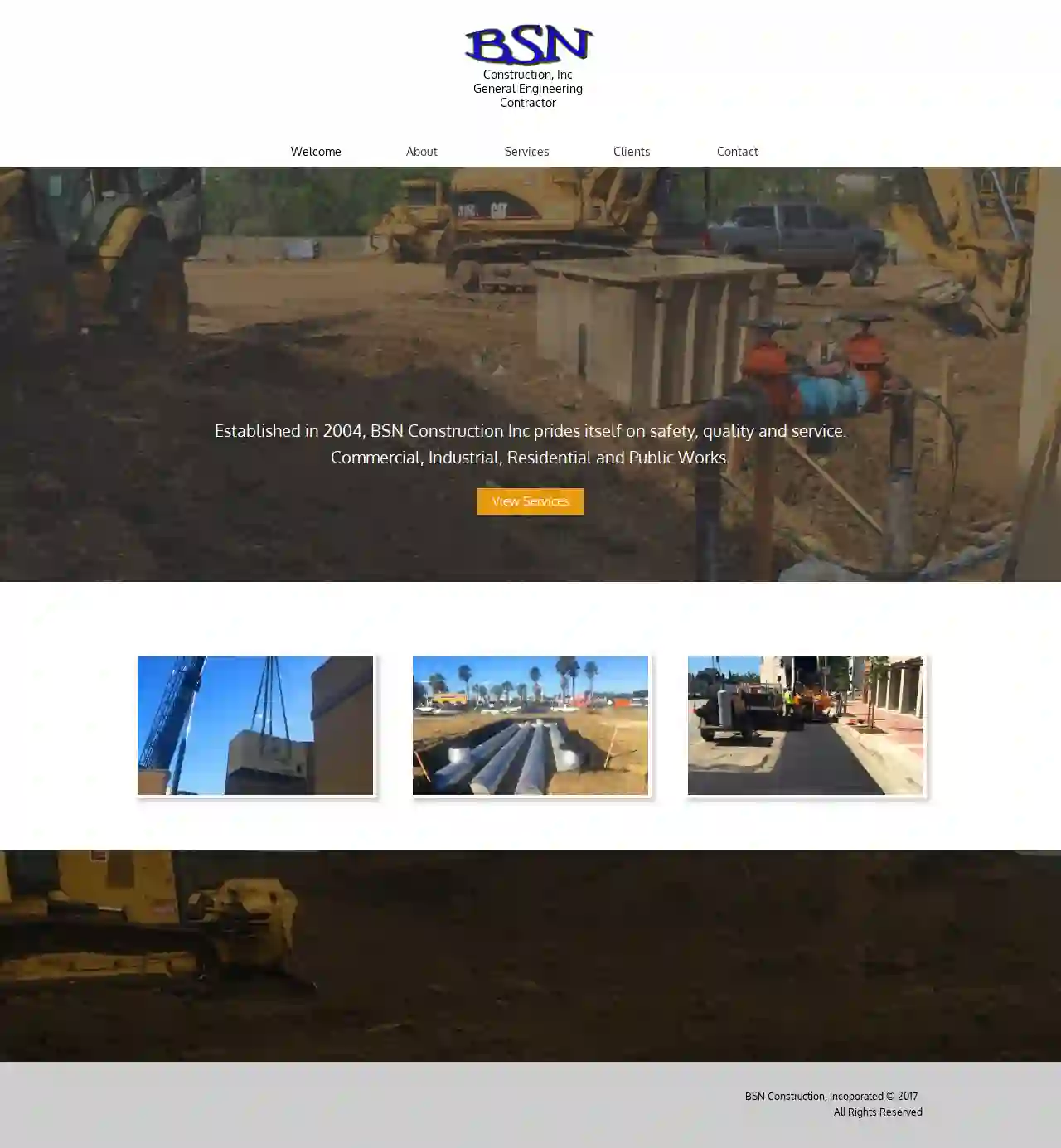Excavation Contractors Oceanside
Top Excavating Contractor in Oceanside
Get 3 FREE Excavation Contractor quotes for your project today! Compare profiles, reviews, accreditations, portfolio, etc... and choose the best service.

KR Land Development LLC: Land Clearing and Site Prep
516 reviewsOrange, USAbout KR Land Development At KR Land Development, our mission is to transform natural landscapes into safe, sustainable, and accessible spaces. With a deep respect for the environment and a commitment to efficiency, we provide expert land clearing services that pave the way for responsible land development. Our goal is to balance the needs of our clients with the preservation of nature, delivering innovative solutions that create a harmonious coexistence between humanity and the land. We are dedicated to improving the accessibility, safety, and utility of our clients’ properties while minimizing our impact on the environment. By aligning cutting-edge technology with eco-conscious practices, we aim to be leaders in the industry, leaving a legacy of well-cleared land and a healthier planet for future generations. Ready to Get Started On Your Land Clearing Project? We've Got You Covered! If you are looking to get started on your next land clearing project, we are here to help! KR Land Development offers free consultations to every client that is interested in our land clearing or property services. We are licensed & insured, protecting our clients and their property at all times throughout the land clearing process.
- Services
- Why Us?
- Gallery
Get Quote
Focus Utility Services
4.19 reviewsOakland, US- Services
- Why Us?
Get Quote
Murray Excavating Inc. Backhoe Service, Excavating and General Engineering Contractor
51 reviewsLatrobe, CA, 95682, USAbout Murray Excavating Inc. Murray Excavating Inc. is a general engineering contractor with over 35 years of experience, specializing in a wide range of services including grading, compaction, trenching, demolition, land clearing, and defensible space preparation. We are committed to providing excellence, outstanding quality, and exceptional customer satisfaction. Our team is HAZWOPER Certified and equipped to handle projects of all sizes, from small residential properties to large-scale commercial developments. We understand the importance of fire safety and have extensive experience in fire debris removal and clean-up. We have worked on major fire events such as the Caldor, Santa Cruz, NAPA, and Paradise Fires, providing comprehensive services that include debris removal, demolition, utility capping, and erosion control. Our goal is to restore your property to a safe and usable condition, while ensuring compliance with all federal and local regulations. Beyond fire-related services, we offer a comprehensive range of solutions for land development and improvement. Our services include brush clearing, mastication, fuel reduction, and land reclamation for various purposes such as recreation, grazing, access, and new construction. We are dedicated to helping you create a safe and sustainable environment for your property. Our team is equipped with a wide range of heavy machinery, including skip loaders, backhoes, excavators, masticators, mowers, dozers, compactors, and 10-wheelers, allowing us to handle any project efficiently and effectively. We are committed to providing our clients with the highest level of service and expertise, ensuring their complete satisfaction.
- Services
- Why Us?
- Gallery
Get Quote
Cascade Environmental
51 reviews22722 29th Drive SE, Ste 228, Bothell, 98021, USWho We Are Cascade Environmental is a field services contractor that partners with our clients to provide seamless environmental and geotechnical solutions, from concept to completion. Over the last 25+ years, Cascade has grown from a Northwest US regional drilling company into a national, full service organization offering innovative solutions for every step of your project. Mission To contribute to a sustainable future through environmental investigation and restoration. Vision To be the premier company that leverages safety, employee expertise, technology, and sustainability to continuously outperform our competition in the infrastructure and environmental remediation industry. Core Values We believe in providing a workplace free of recognized hazards for the safety, health and well-being of our employees and clients. We believe in growing our business in a responsible manner through significant investment in our people, our company, and our communities. We believe in exceeding expectations in everything we do. We believe in working together to achieve goals thru integrity, accountability, and trust. CASCADE ENVIRONMENTAL® Cascade Environmental is the leading field services provider of environmental and geotechnical drilling, site investigation, and remediation. We offer the full suite of drilling technologies including sonic, auger, rotary, and direct push. Our crews are experienced in traditional and high resolution site characterization technologies for groundwater sampling and analysis, contaminant mass and distribution, and other in situ data for detailed and accurate conceptual site models. We also offer a line of injectable amendments designed to help you reach site closure faster and cost-effectively. Who We Are Our experts understand the importance of accurate sampling regardless of geologic conditions. Whether a discrete or representative sample is needed, Cascade has the tools and technologies to obtain it. Our experienced crews can obtain samples from soil, rock and even the most difficult subsurface conditions. Cascade offers a full range of environmental drilling and sampling services for nearly any application. We conduct soil, soil gas, and groundwater sampling, including discrete and representative sampling, vertical aquifer profiling, and bedrock coring.
- Services
- Why Us?
- Gallery
Get Quote
Mark Hoffman General Engineering
121346 Road 140, Tulare, 93274, USMark Hoffman General Engineering Mark Hoffman General Engineering is a licensed contractor serving Central California for over 30 years. Our team of skilled tradesmen and commitment to cutting-edge technology enable us to provide unparalleled service, solutions, and quality. From complex grading to asphalt patching, we are your one-stop shop for turn-key site development. Since 1985, MHGE has built a strong reputation for excellent workmanship, competitive prices, efficient operations, and customer satisfaction. Whether your project is commercial or residential, big or small, new or rehab, you can count on MHGE for the highest standard in customer service. We serve Central California counties of Tulare, Kings, Kern, Fresno, Madera Counties as well as surrounding areas. Call us today for a free estimate, and let us make your next construction project a high-quality, long-lasting success. Licensed • Bonded • Insured License #A489-700
- Services
- Why Us?
- Gallery
Get Quote
Cushman Contracting Corporation
4.84 reviewsP.O. Box 147, Goleta, 93116-0147, USAbout Cushman Contracting Corporation Cushman Contracting Corporation has been building complex projects with quality people since 1969. We are a family-owned and operated business with a strong commitment to our clients and employees. We are proud of our reputation for quality workmanship, on-time delivery, and competitive pricing. We specialize in a variety of construction projects, including: Water/Wastewater Marine Civil Design-Build Unique We are committed to providing our clients with the highest level of service and satisfaction. We believe in building strong relationships with our clients and working closely with them to ensure that their projects are completed on time and within budget. We are also committed to providing our employees with a safe and rewarding work environment. We offer competitive salaries and benefits, as well as opportunities for professional development. If you are looking for a construction company that is committed to quality, service, and safety, then Cushman Contracting Corporation is the right choice for you.
- Services
- Why Us?
- Testimonials
- Gallery
Get Quote
Precision Grading LLC
4.73 reviewsServing Eastern South Dakota in Mitchell, SD and Western South Dakota in Rapid City, Mitchell, USAbout Precision Grading LLC Precision Grading LLC is a professional grading and excavating contractor located in Eastern South Dakota. We specialize in providing high-quality GPS and Laser site development, grading, and excavation services to meet the needs of our clients. Our team is committed to delivering exceptional results, working closely with you to ensure your project is completed on time and within budget. We take pride in our attention to detail and our commitment to safety. Whether you need excavation for a new construction project, grading for a parking lot, or any other site development services, Precision Grading LLC has the experience and expertise to handle your project with precision and efficiency.
- Services
- Why Us?
- Gallery
Get Quote
Optimal EarthWork
51 reviews3070 Garden Ave, San Jose, 95111, USTransforming Landscapes with Precision: Earthworks Experts We harness the raw potential of the earth to create extraordinary transformations and deliver awe-inspiring results for every project we undertake. Excavation & Grading Swimming Pool Demolition Demolition
- Services
- Why Us?
- Accreditations
- Our Team
- Testimonials
- Gallery
Get Quote
BSN CONSTRUCTION, INC
1Suite 200, 1000 Old Country Rd, Garden City, 11747, USBSN Construction: Your Trusted Partner for Quality Construction BSN Construction is a family-owned and operated business with over 20 years of experience in the construction industry. We are committed to providing our clients with the highest quality construction services at competitive prices. We specialize in a wide range of construction projects, including residential, commercial, and industrial. We are also a licensed and insured contractor, so you can rest assured that your project is in good hands. We understand that building or renovating your home or business is a big decision. That's why we take the time to listen to our clients' needs and work with them to develop a plan that meets their specific requirements. We are also committed to providing excellent customer service and keeping our clients informed throughout the entire construction process. If you are looking for a reliable and experienced construction company, look no further than BSN Construction. We are confident that we can provide you with the quality construction services you need to make your project a success.
- Services
- Why Us?
Get Quote
Fontana Concrete Company
3.73 reviewsFontana, USFontana Concrete Company | Flat Work and Masonry Contractor Our team is ready for any concrete project all year round for the homeowners in Fontana! For instance, Concrete or masonry services may be needed to fix cracks or seal gaps in driveways, sidewalks, patios, brick walls, and other areas on your property. If any of this sounds like it applies to you, then contact us today! We will schedule a free estimate with one of our experts to provide a quote tailored to your needs. Give us a call at (909) 766-9768 to get free estimates. Top of the Line Concrete and Masonry Contractor in Fontana, California Fontana Concrete Company is the leading concrete and masonry company in Fontana. We specialize in a wide variety of services, including concrete, patios, sidewalks, pools, garage floors, and more! One of our most popular services is installing fresh concrete – we specialize in working with homeowners to make sure you get exactly what you need. No matter your needs or budget, we have a solution for you! Contact us today at (909) 766-9768 to learn more about how we can help give your home that perfect finishing touch. Fontana Concrete Company understands that when it comes time to improve or add on to your property, one of the first things people think about are their driveways and walkways – they’re key features when it comes time to sell a house or show off your landscaping. We offer many different concrete services, including stamping, coloring, and decorative work, to make sure you get the look you want – all at an affordable price! Fontana Concrete Company has been working in Fontana for many years, and our experience means we know what works best when it comes time to renovate or improve your property. When you choose us as your contractor of choice, you can expect quality craftsmanship and honest pricing that won’t break the bank! Our commitment is 100% customer satisfaction, so call us today at (909) 766-9768 for a free estimate on any of our products or services.
- Services
- Why Us?
- Gallery
Get Quote
Over 3,943+ Excavation Businesses registered
Our excavation providers operate in Oceanside & surrounding areas!
ExcavationHQ has curated and vetted Top Excavation Companies in Oceanside. Find a reliable contractor today.
Frequently Asked Questions About Excavation Contractors
- Experience: Choose contractors with a proven track record and years of experience in excavation projects similar to yours.
- Licensing and Insurance: Verify that they are properly licensed to operate in your area and carry adequate insurance to protect you from liability in case of accidents or damage.
- Equipment and Resources: Ensure they have the necessary equipment and resources to handle your project efficiently and safely.
- Positive Reviews and References: Check online reviews and testimonials from previous customers. Request references and contact them to inquire about their experience with the contractor.
- Professionalism: Opt for a company that communicates clearly, provides detailed and transparent estimates, and has a responsive and courteous team.
- Hauling to Designated Disposal Sites: Transporting excavated material to approved landfills or recycling centers.
- Recycling or Reuse: If suitable, some excavated soil might be recycled for other projects or reused on-site for landscaping or backfilling.
- Complying with Regulations: Adhering to local and environmental regulations for soil disposal to prevent contamination or illegal dumping.
- Project Size and Scope: The larger and more complex the excavation, the higher the cost.
- Soil Type: Different soil types require different equipment and techniques, impacting costs. Rocky or clay-rich soil can be more expensive to excavate than loose soil.
- Accessibility: Difficult-to-access sites might require specialized equipment or additional labor, increasing expenses.
- Disposal Costs: Hauling away excavated material (soil, rocks, etc.) to disposal sites incurs additional fees.
- Permits and Inspections: Depending on local regulations, permits and inspections might be required, adding to the overall cost.
- Topsoil Removal: Stripping the fertile topsoil layer from a site, often preserving it for landscaping.
- Trench Excavation: Digging long, narrow trenches for utilities (pipes, cables) or foundations.
- Basement Excavation: Removing earth to create a space for a basement beneath a structure.
- Pool Excavation: Digging a precise hole for installing a swimming pool.
- Roadway Excavation: Removing earth and preparing the ground for road construction.
- Demolition Excavation: Clearing debris and preparing the site after demolition.
- Channel Excavation: Creating channels for drainage or irrigation.
How do I find a good excavation contractor?
How do you handle soil disposal after excavation?
How much does excavation cost?
What are the different types of excavation?
How do I find a good excavation contractor?
- Experience: Choose contractors with a proven track record and years of experience in excavation projects similar to yours.
- Licensing and Insurance: Verify that they are properly licensed to operate in your area and carry adequate insurance to protect you from liability in case of accidents or damage.
- Equipment and Resources: Ensure they have the necessary equipment and resources to handle your project efficiently and safely.
- Positive Reviews and References: Check online reviews and testimonials from previous customers. Request references and contact them to inquire about their experience with the contractor.
- Professionalism: Opt for a company that communicates clearly, provides detailed and transparent estimates, and has a responsive and courteous team.
How do you handle soil disposal after excavation?
- Hauling to Designated Disposal Sites: Transporting excavated material to approved landfills or recycling centers.
- Recycling or Reuse: If suitable, some excavated soil might be recycled for other projects or reused on-site for landscaping or backfilling.
- Complying with Regulations: Adhering to local and environmental regulations for soil disposal to prevent contamination or illegal dumping.
How much does excavation cost?
- Project Size and Scope: The larger and more complex the excavation, the higher the cost.
- Soil Type: Different soil types require different equipment and techniques, impacting costs. Rocky or clay-rich soil can be more expensive to excavate than loose soil.
- Accessibility: Difficult-to-access sites might require specialized equipment or additional labor, increasing expenses.
- Disposal Costs: Hauling away excavated material (soil, rocks, etc.) to disposal sites incurs additional fees.
- Permits and Inspections: Depending on local regulations, permits and inspections might be required, adding to the overall cost.
What are the different types of excavation?
- Topsoil Removal: Stripping the fertile topsoil layer from a site, often preserving it for landscaping.
- Trench Excavation: Digging long, narrow trenches for utilities (pipes, cables) or foundations.
- Basement Excavation: Removing earth to create a space for a basement beneath a structure.
- Pool Excavation: Digging a precise hole for installing a swimming pool.
- Roadway Excavation: Removing earth and preparing the ground for road construction.
- Demolition Excavation: Clearing debris and preparing the site after demolition.
- Channel Excavation: Creating channels for drainage or irrigation.